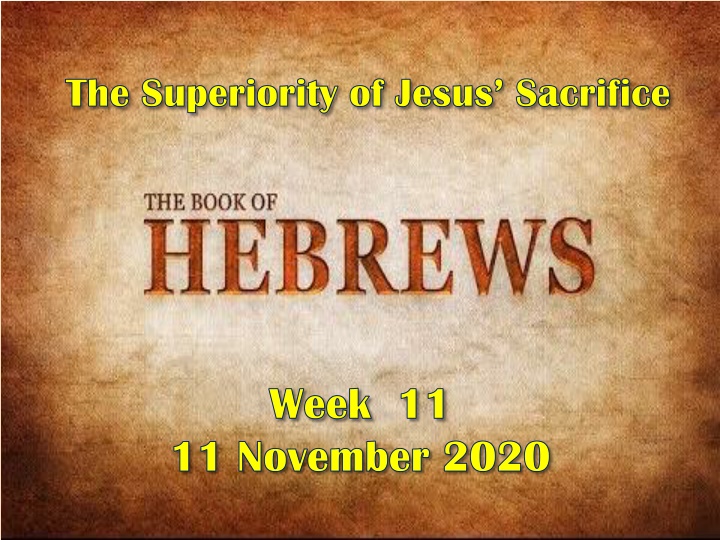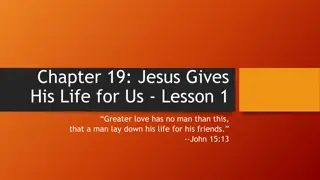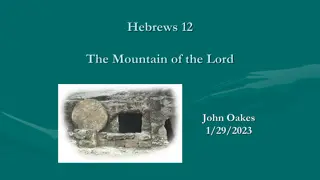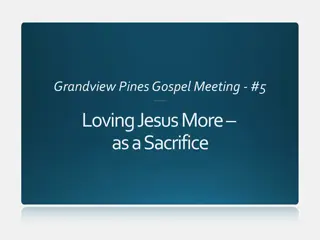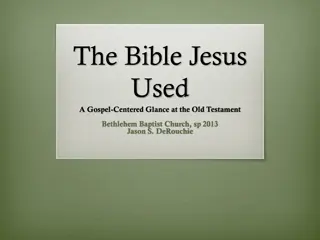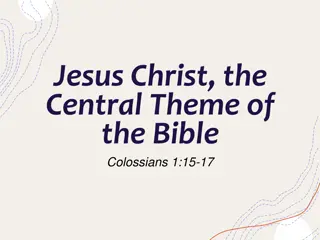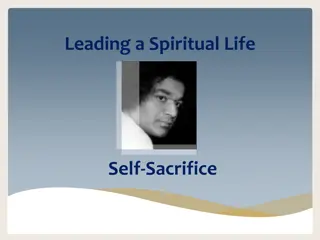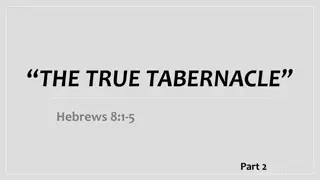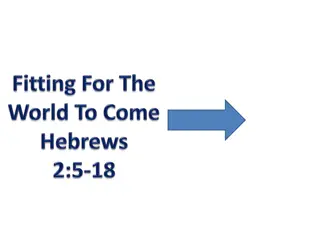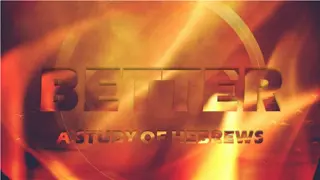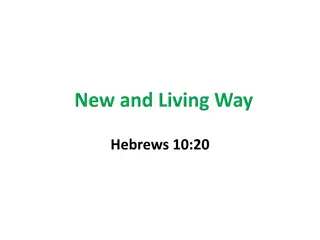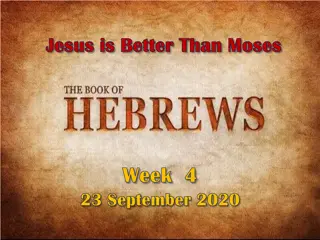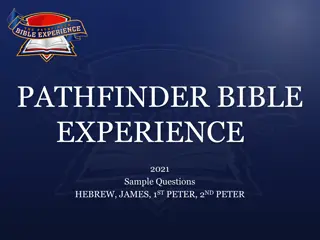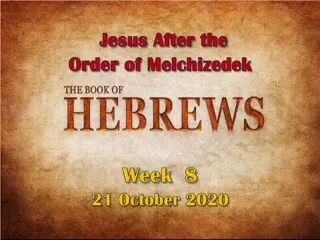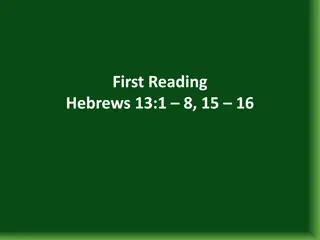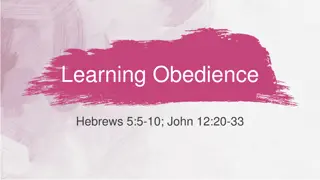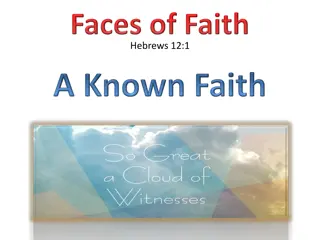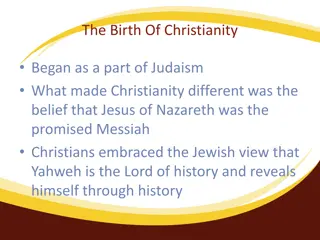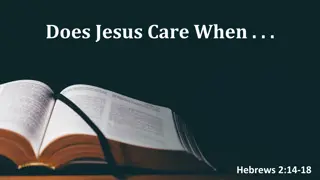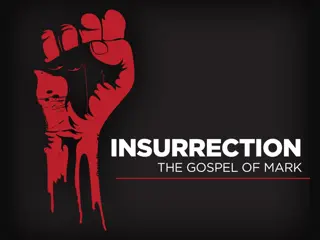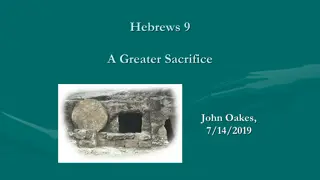Exploring the Superiority of Jesus' Sacrifice in Hebrews
Delve into the profound discussions in Hebrews regarding the superiority of Jesus' sacrifice over animal sacrifices, emphasizing the importance of drawing near to God, avoiding willful sin, and grasping the significance of Christ's priesthood and atonement.
Download Presentation

Please find below an Image/Link to download the presentation.
The content on the website is provided AS IS for your information and personal use only. It may not be sold, licensed, or shared on other websites without obtaining consent from the author.If you encounter any issues during the download, it is possible that the publisher has removed the file from their server.
You are allowed to download the files provided on this website for personal or commercial use, subject to the condition that they are used lawfully. All files are the property of their respective owners.
The content on the website is provided AS IS for your information and personal use only. It may not be sold, licensed, or shared on other websites without obtaining consent from the author.
E N D
Presentation Transcript
The Superiority of Jesus Sacrifice The Superiority of Jesus Sacrifice Week 11 Week 11 11 November 2020 11 November 2020
Chapter 10 Chapter 10
HEBREWS REVIEW Chapter 1: Jesus, Better than Prophets and Angels (1:1-14) Chapter 2: Jesus, Better than the Angels (2:1-18) Chapter 3: Jesus, Better than Moses (3:1-19) Chapter 4: Jesus, Better than Joshua (4:1-16) Chapter 5: Jesus, Better than Aaron as Priest (5:1-14) Chapter 6: Jesus, Press On To Maturity (6:1-20). Chapter 7: Jesus, After the Order of Melchizedek (7:1-17). Chapter 8: New Covenant Better than the Old (8:1-13). Chapter 9: New Sanctuary and Sacrifice Better than the Old (9:1-28). THISLESSON . . . Chapter 10: New Covenant Settles Forever Our Salvation (10:1-18). Chapter 10: Life of Christ Gives Assurance of Faith (10:19-39).
HEBREWS CHAPTER 10 Overview of Chapter 10: The animal sacrifices of the Law (the first covenant) are shown to be insufficient, against the superiority of Christ s sacrifice and His death fulfills the will of God and perfects those who are being sanctified (1-18). A three-fold exhortation based on what Christ has done. The exhortation to draw near and holdfast (19-25) The fifth of six warnings, this one against despising God s grace with willful sin (26-39).
HEBREWS CHAPTER 10 Points to Ponder: Why Christ s sacrifice is superior to animal sacrifices. The importance of drawing near to God and assembling with brethren. The terrifying condition of Christians who persist in willful sin.
HEBREWS CHAPTER 9 Discussion: Throughout the book of Hebrews, Paul has presented the biblical argument that Christ s person and work is superior to that of the Old Testament priests and their ministry. In Hebrew 9, Paul mentioned
HEBREWS CHAPTER 9 Discussion: Here, we will examine the limitations and purpose of the Law what it can t do and what it continually does (10:1-4). We will explore the contrast between the old covenant Law and the superior priesthood of Christ how His offering of his own body was one for all, once for all, and free for all (10:5-14). And then we will see the benefits of Christ s person and work for us today (10:15-18).
Hebrews 10:1 - 4 1The law is only a shadow of the good things that are coming not the realities themselves. For this reason it can never, by the same sacrifices repeated endlessly year after year, make perfect those who draw near to worship. 2Otherwise, would they not have stopped being offered? For the worshipers would have been cleansed once for all, and would no longer have felt guilty for their sins. 3But those sacrifices are an annual reminder of sins. 4It is impossible for the blood of bulls and goats to take away sins.
HEBREWS CHAPTER 10 Discussion: The Law was merely a shadow of the good things to come. The Law served a valid purpose, but it was limited in what it could accomplish. It couldn t make perfect those who draw near by means of the animal sacrifices made over and over again, year after year. Imagine if a married couple had to run back to the altar and get married every time they got into an argument. Thankfully, marriage doesn t work that way. It takes just one trip to the altar for a bride and groom to be married.
HEBREWS CHAPTER 10 Discussion: This is what it was like with the sacrificial system in the Law. If the Law had been able to perfectly and completely deal with the relationship-breaking power of sin and guilt, there wouldn t have been a need for a continual return to the altar (10:2). All the guilt would have been gone banished when the blood was spilled, forgotten when the sacrificial lamb went up in smoke.
HEBREWS CHAPTER 10 Discussion: Paul is careful not to disparage the Law. The sacrifices were not foolish, meaningless, or sinful. They were, after all, decreed by God and served a purpose. But what was the purpose of the Law? Paul tells us that in those sacrifices there is a reminder of sins year by year. Moreover, the sacrifices can never make worshipers perfect: For it is impossible for the blood of bulls and goats to take away sin (10:4).
HEBREWS CHAPTER 10 Discussion: Underscore the word impossible. Not improbable, not difficult, not unlikely, not rare. Impossible! Paul is referring the limitations of the sacrifices under the Old Testament Law itself. It has always been impossible for the blood of animal sacrifices to take away sins. If the sacrifices did anything permanently, it was to remind the people of Israel of their sinfulness. Just as a speed limit sign reminds us of the law, and a speeding ticket reminds us of our guilt.
HEBREWS CHAPTER 10 Discussion: Under the old system, Israel s national sins accumulated daily over the course of the year; then the sacrifices of the Day of Atonement temporarily covered them. They accumulated again the next year; the Day of Atonement covered them again. The old covenant kept kicking the can of sin down the road, so to speak. But that system of endless blood got old.
Hebrews 10:5 - 7 5Therefore, when Christ came into the world, he said: Sacrifice and offering you did not desire, but a body you prepared for me; 6with burnt offerings and sin offerings you were not pleased. 7Then I said, Here I am it is written about me in the scroll I have come to do your will, my God. Psalm 40:6-8 > Sacrifice and offering you did not desire but my ears you have opened burnt offerings and sin offerings you did not require. 7Then I said, Here I am, I have come it is written about me in the scroll. 8I desire to do your will, my God; your law is within my heart.
HEBREWS CHAPTER 10 Discussion: Paraphrases Psalm 40:6-8, Paul contrasts the once- for-all coming of Christ with the over-and-over again sacrificial system. That is, because the blood of animals could never take away sins, the Son of God came into the world. Jesus did what no thing and no one else could do. Ultimately, God doesn t desire sacrifice and offering as a means of complete cleansing and total forgiveness (10:5) a thought that is paralleled in 10:6.
HEBREWS CHAPTER 10 Discussion: For the purpose of eternal salvation, God took no pleasure in the endless line of smoke ascending from the altar as the priests carried out the prescribed sacrifices. When it came to animal sacrifices, the beasts were offered againsttheir will. At best, the animal would stand in ignorance and submit to the knife. In fact, under this system, even the worshipers bringing the animals, or the priests presenting the sacrifices, could do so without understanding, emotion, or will.
HEBREWS CHAPTER 10 Discussion: Monotonous routine can reduce a meaningful rite to mindless ritual. With God s Son, there was a real will involved a truly human will that submitted obediently to the will of the Father. Having taken on full humanity in the incarnation, the Son of God came to do God s will in fulfillment of everything written about Him in the Old Testament (10:7).
Hebrews 10:8 - 14 8First he said, Sacrifices and offerings, burnt offerings and sin offerings you did not desire, nor were you pleased with them though they were offered in accordance with the law. 9Then he said, Here I am, I have come to do your will. He sets aside the first to establish the second. 10And by that will, we have been made holy through the sacrifice of the body of Jesus Christ once for all. 11Day after day every priest stands and performs his religious duties; again and again he offers the same sacrifices, which can never take away sins. 12But when this priest had offered for all time one sacrifice for sins, he sat down at the right hand of God, 13and since that time he waits for his enemies to be made his footstool. 14For by one sacrifice he has made perfect forever those who are being made holy.
HEBREWS CHAPTER 10 Discussion: God essentially set aside the old, inferior system of the Law and its sacrifices in order to accomplish on behalf of humanity what no other human could have accomplished complete obedience to the Father (10:8-9). What was impossible for frail, fallible, fallen humans was possible only for the powerful, perfect, pure God-man, Jesus. Jesus accomplished the permanent cleansing that could never have occurred through animal sacrifices: We have been made holy through the sacrifice of the body of Jesus Christ once for all (10:10).
HEBREWS CHAPTER 10 Discussion: Paul reminds his readers that priests must offer sacrifices continually those sacrifices could never take away sin. As such, the priest stands daily to carry out the bloody sacrifices over and over again (10:11). In contrast to the priests standing ministry, Jesus sat down at the right hand of God because his one sacrifice accomplished for all time what could never have been accomplished by the daily sacrifices: complete payment for sins (10:12).
HEBREWS CHAPTER 10 Discussion: Paul puts it this way: For by oneoffering He (Jesus) has perfected for alltimethose who are sanctified (10:14). Now, Christ sits enthroned at the right hand of the Father, awaiting the time of His second coming, when His enemies will be ultimately vanquished in judgment and the Kingdom of God will be manifested in its fullness (10:13).
Hebrews 10:15 - 18 15The Holy Spirit also testifies to us about this. First he says: 16 This is the covenant I will make with them after that time, says the Lord. I will put my laws in their hearts, and I will write them on their minds. 17Then he adds: Their sins and lawless acts I will remember no more. 18And where these have been forgiven, sacrifice for sin is no longer necessary.
HEBREWS CHAPTER 10 Discussion: Paul points out the benefits of Christ s superior priesthood. He returns to the language of the new covenant and reminds his readers of what Christ has accomplished through His once-for-all sacrifice for sin. The Holy Spirit testifies to us (10:15) that is, to believers that the new arrangement will put the law in our hearts and minds (10:16), signifying an internal transformation with eternal effects: our sins are forgiven and remembered no more (10:17).
HEBREWS CHAPTER 10 Discussion: This new arrangement, now made possible through Christ, brings all the resource we need and places them within us. The sin issue that had destroyed our relationship with God and hindered righteousness and spiritual growth has been deal with. And more than that, we have a new ability to follow in Christ s footsteps to offer our bodies as a living and holy sacrifice, acceptable to God (Romans 12:1).
HEBREWS CHAPTER 10 Discussion: The Hebrew believers who had been slipping backward into their old fascination with the Law and its sacrifices needed to be reminded of its limitations. They had to hear in no uncertain terms that it was impossible for the blood of animal sacrifices to take away sins (10:4). In essence, they needed to hear the good news that the perfect sacrifice of Christ was one for all, once for all, and free for all.
Hebrews 10:19 - 21 19Therefore, brothers and sisters, since we have confidence to enter the Most Holy Place by the blood of Jesus, 20by a new and living way opened for us through the curtain, that is, his body, 21and since we have a great priest over the house of God,
HEBREWS CHAPTER 10 Discussion: Only the high priest, after a precise process of ritual cleansing, could enter the holy of holies once a year on the Day of Atonement. For everyone else even other priest it was off limits. When the tabernacle was replace by the temple in Jerusalem, a giant veil still separated the holy of holies from the rest of the temple. When Jesus died, that massive curtain was torn asunder from top to bottom (Matt 27:51), signaling a dramatic change from the old system to the new.
HEBREWS CHAPTER 10 Discussion: Here, Paul strengthens his readers with twoimportantfacts . . . FIRST Jesus blood His perfect sacrifice for sin has opened the way for us to enter into a personal relationship with God (10:19-20). As the heavy temple curtain was torn from top to bottom on that first Good Friday, so that pure and spotless body of Christ was rent for us.
HEBREWS CHAPTER 10 Discussion: Here, Paul strengthens his readers with two important facts . . . SECOND Jesus remains as our Great High Priest over the House of God (10:21). The image of house in the old covenant also including the idea of church in the new. The NT applies the image of the temple in a spiritual sense: (1) the church as the temple of God (1Cor 3:16) and (2) the bodies of individual believers as God s temple (1Cor 6:19).
Hebrews 10:22 - 25 22Let us draw near to God with a sincere heart and with the full assurance that faith brings, having our hearts sprinkled to cleanse us from a guilty conscience and having our bodies washed with pure water. 23Let us hold unswervingly to the hope we profess, for he who promised is faithful. 24And let us consider how we may spur one another on toward love and good deeds, 25Not forsaking the assembling of ourselves together, as the manner of some is; but exhorting one another: and so much the more, as ye see the day approaching.
HEBREWS CHAPTER 10 Discussion: Here, Paul sets forth three commands to obey, each introduced by the exhortation Let us . . . FIRST let us draw near (10:22). We ve already seen that the saving work of Christ has cleansed our consciences from sin and guilt. This internal cleansing of the heart the internal, invisible dimension should be marked by the washing of our bodies the external, visible aspects of our lives. To draw near invites those who have been eternally forgiven to go deeper in relationship with Christ.
HEBREWS CHAPTER 10 Discussion: Here, Paul sets forth three commands to obey, each introduced by the exhortation Let us . . . SECOND let us speak out (10:23). Because the emphasis in this passage is both the internal and external the conformity of the whole person to Christ in faith and obedience Paul has in mind a confession with both words and actions. With a strong confidence in the superior priesthood of Christ, we can continue to confess him with our mouths and emulate Him with our lives.
HEBREWS CHAPTER 10 Discussion: Here, Paul sets forth three commands to obey, each introduced by the exhortation Let us . . . THIRD let us stir up (10:24-25). As a member of the body of Christ, the church, we have a responsibility to live lives of faith and obedience in such a way that we positively stir up others toward love and spiritual growth. We should encourage the internal motivation of others. This motivation should manifest itself in external actions good deeds (10:24).
Hebrews 10:26 - 31 26For if we sin willfully after that we have received the knowledge of the truth, there remains no more sacrifice for sins, 27But a certain fearful looking for of judgment and fiery indignation, which shall devour the adversaries. 28He that despised Moses law died without mercy under two or three witnesses: 29Of how much sorer punishment, suppose ye, shall he be thought worthy, who has trodden under foot the Son of God, and has counted the blood of the covenant, wherewith he was sanctified, an unholy thing, and has done despite unto the Spirit of grace? 30For we know him that has said, Vengeance belongs unto me, I will recompense, saith the Lord. And again, The Lord shall judge his people. 31It is a fearful thing to fall into the hands of the living God.
HEBREWS CHAPTER 10 Discussion: Here, Paul presents a strong warning to those who fail to keep the commands of Let us . . . draw near, speak out, and stir up. Paul speak of the we as those who have genuinely received eternal salvation by grace through faith, but who, through backsliding, can enter a state of sin from which there is no possibility of return (10:26). These are believers who have backed away from God rather than drew nearer to Him lacking accountability indistinguishable from unbelievers.
HEBREWS CHAPTER 10 Discussion: This isn t just a stumble, a season of rebellion, or a constant struggle against temptation and sin. We all experience these. This is outrightopposition against the gracious, loving, merciful Father. Paul notes that under the old covenant, those who rebelled against the Law received harsh judgment (10:28). How much more should those be judged who blatantly rebel against the grace of God under the superior covenant established by Christ s death and resurrection (10:29).
HEBREWS CHAPTER 10 Discussion: They have opposed Father, Son, and Holy Spirit in their high-handed revolt against their Master (10:29,30). God disciplines His children severely when they reach that point of no return when they continue in willful defiance and fall into His hands (10:31). Paul declares it hasn t happened to his readers yet, but if some of them continuedown the path away from the grace of Christ and the new covenant, it could happen even to them.
Hebrews 10:32 - 35 32Remember those earlier days after you had received the light, when you endured in a great conflict full of suffering. 33Sometimes you were publicly exposed to insult and persecution; at other times you stood side by side with those who were so treated. 34You suffered along with those in prison and joyfully accepted the confiscation of your property, because you knew that you yourselves had better and lasting possessions. 35So do not throw away your confidence; it will be richly rewarded.
HEBREWS CHAPTER 10 Discussion: Paul reminds his readers that in their former days, they had endured great suffering, public reproaches, tribulations, and persecution (10:32:33). Even in the midst of these trials, they had remained steadfast in their Christian witness. They didn t shy away from suffering for Christ (10:33). They showed genuine love and concern for others in need, and they demonstrated a priority for heavenly reward over earthly treasures (10:34-35).
Hebrews 10:36 - 39 36For you have need of endurance, so that after you have done the will of God, you may receive the promise: 37 For yet a little while, And He who is coming will come and will not tarry. 38Now the just shall live by faith; But if anyone draws back, My soul has no pleasure in him. 39But we are not of those who draw back to perdition, but of those who believe to the saving of the soul.
HEBREWS CHAPTER 10 Discussion: Paul tells his readers to endure. And because they have already demonstrated their ability to endure through hardship, nothing should stand in their way of moving forward in confident commitment to their faith and obedience to Christ (10:36). Paul s message is clear: Hang in there! The journey is almost over. The reward is worth it. The consequences for falling away are too severe. Even though he couches this encouragement with ominous warnings, Paul is confident in the condition of his readers the Just living by faith (10:37-39).
